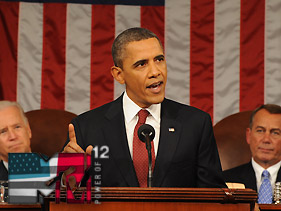High school students focus heavily on President Obama’s stance on education reform. By Gil Kaufman President Obama delivers the State of the Union address on Tuesday night Photo: CBS One of the most important lessons high school-age members of the Junior State of America learn is the value of vigorous yet civil debates about the state of government and foreign affairs. That’s why a handful of JSA members contacted by MTV News on Wednesday (January 25) had widely divergent but measured reactions to President Obama’s State of the Union address. “The most significant part of his speech for me was his take on education,” said Saaye Arumugam, a 17-year-old high school senior in Miamisburg, Ohio. “During the Bush administration with No Child Left Behind, the federal government perpetuated this idea that standardized education was the only route to gauge success. Obama addressed that critical thinking should outweigh this idea of standardized thinking and teaching to the test.” Obama called for states to require students to stay in school until age 18 and to replace teachers who are ineffective. The portion about lowering college interest rates also piqued the interest of home-schooled senior Chris Boyajian of Lumberton, New Jersey. “When he talked about college tuition and getting interest rates down on loans and getting tuition lower, that was important to me,” said Boyajian, 17. “[But] I didn’t agree when he said that college is for everyone. I think it’s not. There are some people who wouldn’t fit in college, but I did like what he said about getting interest rates down so we’re not paying two or three times the loan.” One reason Boyajian was so focused on the cost of college was because he’s planning to go to law school. “I’m trying very hard not to take out loans [for college] … I’m trying to pay with my family’s savings or merit-based scholarships.” Because their organization is based on civil discourse, a number of the JSA members said they were disappointed by the gridlock in Washington and not particularly optimistic about the president’s chances of getting his initiatives passed, especially during an election year. Englewood, California, senior Michael Escobar, 17, was hopeful that at least one would get pushed through: Obama’s call for a return of manufacturing to the U.S. “It’s essential for prosperity, and it rewards companies with tax breaks,” he said. “I will go to college soon and hopefully in the future there will be a job opening ready for me … A lot of students are investing a lot of money in bachelor’s and master’s, and there’s no guarantee of a job.” Escobar also paid close attention to the president’s plans to reform education, since he said he’s seen firsthand the effect of the cuts in education at his school and worries that the gridlock in Congress could stall Obama’s initiatives. “We have a lot of low-income families at my school, and it’s really frustrating,” he said about budget cuts to education. As a member of student council with access to budget and attendance information, Escobar said that since funding for advanced placement exams at his school dried up, some of the low-income families have to pay nearly $300 for AP classes out of their own pockets. “Colleges are asking for those most difficult courses, but there’s not enough funding for education to cover it.” Austin, Texas, high school senior Nick Goulding said he found himself getting increasingly irritated as the speech went on. “President Obama was saying the same things he’s been saying for three years ago now,” said Goulding, 18. “He’s trying to make people feel bad about being successful in America. When he was talking about millionaires and trying … to alienate them about their success. I don’t know why you’d want that in a president.” As an example, he mentioned his father, who came from a poor family and worked his way up to founding a very successful landscaping company. “Increasing taxes on those who are successful is counterproductive to what should occur in a free country.” And while Goulding was not enthused about the president’s call for a “Buffett tax” on millionaires and billionaires, he did appreciate how respectful Obama was when talking about the armed forces. “One of the few things I do attribute to the president as far as successes is killing Osama bin Laden and ending the wars,” he said. As a high school junior at the Orange County High School of the Arts, Julianna Ross, 16, also paid close attention to the bits about education reform, but she was focused on Obama’s plea for bipartisanship in Washington. “He basically said under our current system we can’t progress and we won’t make advancement on these issues,” she said, echoing her colleagues’ concerns. “One of the things we talk about at Junior Statesmen is fostering civil discourse … which has taught me to understand the opposing side … and learn how to compromise. That’s something that really needs to be implemented in the real world of politics.” Share your thoughts on the president’s State of the Union address in the comments below. Check back for up-to-the-minute coverage on the primary races and stick with PowerOf12.org throughout the 2012 presidential election season.

More:
State Of The Union Draws Mixed Reactions From Junior Statesmen
























